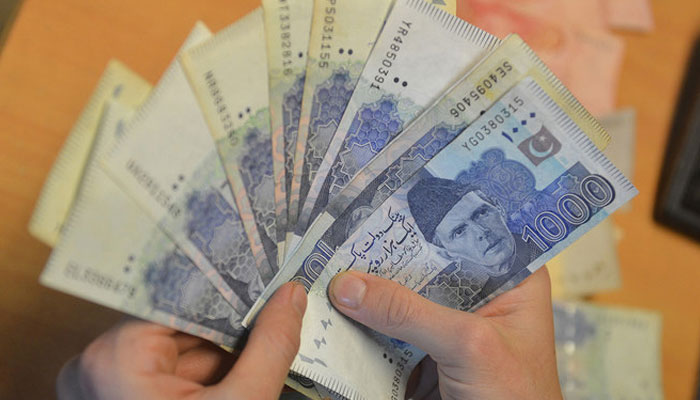Government plans to borrow Rs10tr in T-bills, bonds auctions
KARACHI: The government is set to borrow Rs10.10 trillion from banks through the sale of treasury bills and bonds in the second quarter (October-December) of FY2025, reflecting its increased funding needs to finance the budget deficit and repay the old debt.
According to the auction target calendar issued by the State Bank of Pakistan on Tuesday, the government aims to raise Rs5.2 trillion through short-term paper or Market Treasury Bills auctions with maturities of three, six, and 12 months.
The government also plans to sell fixed and floating rate Pakistan Investment Bonds (PIBs) with maturities of two, three, five and 10 years to borrow Rs4.9 trillion from commercial banks.
It is noteworthy to mention that the government has started a T-bill buyback programme in an effort to reprofile its debt and reduce the burden of debt payment expenses. However, it aims to raise large sums from the domestic markets this quarter. The government needs to mature a large Rs8.82 trillion in T-bills between October and December, which is the cause.
In an auction on Monday, the government repurchased T-bills for the first time, amounting to Rs351 billion against the Rs500 billion target. Following better-than-expected Pakistan’s inflation data, which showed the consumer price index dropped to 6.9 per cent in September -- the lowest level since January 2021 -- and compared to 9.6 percent in the previous month, the government released its most recent borrowing schedule. Numerous important elements, such as a high base effect, falling global commodity and energy prices, and a stable local currency, support this disinflationary tendency.
There was some fear in the money markets due to the dramatic decrease in inflation, with funds and corporates heavily participating in the buying side, according to analysts. The yields on the bonds and notes decreased by 15 to 30 basis points (bps) across most tenors after the SBP conducted a buyback of T-bills and last week’s auction was also rejected. On Tuesday, the 10-year Pakistan Investment Bonds closed at 11.88 per cent.
Declining inflation strengthens another rate cut case
The fact that inflation is predicted to stay in the single digits in the coming months will strengthen the case for further rate cut by the SBP for the fourth consecutive month at its monetary policy meeting, which is scheduled for November.
Analysts expect the SBP to reduce rates by further 200bps in both the November and December meetings. The SBP has already cut rates by 450bps since June.“As the country enters the 37-month IMF programme under the Extended Fund Facility, we expect the external account to remain fully funded, along with the accumulation of FX reserves and a reduced likelihood of fiscal slippage,” said Awais Ashraf, the director research at AKD Securities Limited.
“This strengthens our expectation for currency stability, increasing the chances of keeping inflation in check. We forecast average inflation to drop below 8 percent YoY for FY25, down from 23.8 percent YoY in FY24, driven by the recent disinflationary trend, lower oil prices and a stable political environment,” he said. “These factors would allow the SBP to adopt aggressive monetary easing and we may see interest rates around 12-13 per cent by the end of the fiscal year.”
-
 James Van Der Beek's Friends Helped Fund Ranch Purchase Before His Death At 48
James Van Der Beek's Friends Helped Fund Ranch Purchase Before His Death At 48 -
 King Charles ‘very Much’ Wants Andrew To Testify At US Congress
King Charles ‘very Much’ Wants Andrew To Testify At US Congress -
 Rosie O’Donnell Secretly Returned To US To Test Safety
Rosie O’Donnell Secretly Returned To US To Test Safety -
 Meghan Markle, Prince Harry Spotted On Date Night On Valentine’s Day
Meghan Markle, Prince Harry Spotted On Date Night On Valentine’s Day -
 King Charles Butler Spills Valentine’s Day Dinner Blunders
King Charles Butler Spills Valentine’s Day Dinner Blunders -
 Brooklyn Beckham Hits Back At Gordon Ramsay With Subtle Move Over Remark On His Personal Life
Brooklyn Beckham Hits Back At Gordon Ramsay With Subtle Move Over Remark On His Personal Life -
 Meghan Markle Showcases Princess Lilibet Face On Valentine’s Day
Meghan Markle Showcases Princess Lilibet Face On Valentine’s Day -
 Harry Styles Opens Up About Isolation After One Direction Split
Harry Styles Opens Up About Isolation After One Direction Split -
 Shamed Andrew Was ‘face To Face’ With Epstein Files, Mocked For Lying
Shamed Andrew Was ‘face To Face’ With Epstein Files, Mocked For Lying -
 Kanye West Projected To Explode Music Charts With 'Bully' After He Apologized Over Antisemitism
Kanye West Projected To Explode Music Charts With 'Bully' After He Apologized Over Antisemitism -
 Leighton Meester Reflects On How Valentine’s Day Feels Like Now
Leighton Meester Reflects On How Valentine’s Day Feels Like Now -
 Sarah Ferguson ‘won’t Let Go Without A Fight’ After Royal Exile
Sarah Ferguson ‘won’t Let Go Without A Fight’ After Royal Exile -
 Adam Sandler Makes Brutal Confession: 'I Do Not Love Comedy First'
Adam Sandler Makes Brutal Confession: 'I Do Not Love Comedy First' -
 'Harry Potter' Star Rupert Grint Shares Where He Stands Politically
'Harry Potter' Star Rupert Grint Shares Where He Stands Politically -
 Drama Outside Nancy Guthrie's Home Unfolds Described As 'circus'
Drama Outside Nancy Guthrie's Home Unfolds Described As 'circus' -
 Marco Rubio Sends Message Of Unity To Europe
Marco Rubio Sends Message Of Unity To Europe




